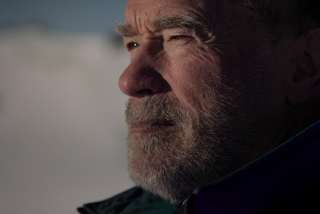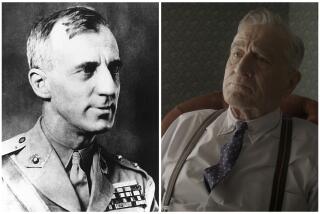Finding the Traitor Who Was Once a Hero
- Share via
To say that writer William Mastrosimone has been obsessed with the famed Revolutionary War traitor Benedict Arnold is something of an understatement. In fact, for the last 25 years, he’s been trying to get his screenplay of “Benedict Arnold: A Question of Honor” made into a movie. Finally, A&E; made his dream a reality.
The two-hour historical drama premieres Monday on the cable outlet with Aidan Quinn playing the brilliant general turned traitor and Kelsey Grammer as his surrogate father, confidant and good friend, George Washington.
“I wrote this in graduate school,” says Mastrosimone (“Extremities”). “I was in theater school and I wrote this on my own time. It wasn’t until 1982 that I started to have some success in the theater and people would fly me out to L.A. Every time I would have a little success [as a screenwriter], they would say, ‘Bill, what would you like to work on? What is your passion?’ I would say, ‘Benedict Arnold.’ They would say, ‘You have to be out of your mind. We are not going to make a movie about a traitor.’ But they were blinded. They didn’t know about him.”
While researching his graduate thesis project at Rutgers University -- a play about the Revolutionary War battles of Trenton and Princeton -- Mastrosimone came across a letter Washington wrote to Arnold asking for the aid of his trusted advisor. Mastrosimone was shocked that the Father of Our Country put so much trust in Arnold. So he set out to learn more about the turncoat.
“One day I walked into the library at Rutgers and I was blown away by the story of Benedict Arnold because it was all there. I mean, the writer only has to show up. It’s a love triangle. It involves two great men. It’s a Greek tragedy on American soil. It was all there for a writer to pick up.”
As depicted in the film, Arnold was an officer of epic proportions, brave, courageous and a great leader of men. When Congress failed to provide adequate pay to him and his men, he used his own money to pay his soldiers and ended up going bankrupt. And a wound to his knee during a battle left him partially crippled.
But he was also a complex man. His father drank away most of the family fortune, and young Benedict was ridiculed by the townspeople when he was sent by his mother to get his father out of the local taverns.
Arnold was also a hothead. “He spent his whole life fighting for his honor,” says Quinn. “He was constantly writing letters to the press if they said anything negative about him.”
As a widower, he fell in love with the rich, beguiling Philadelphian Peggy Shippen, who had allegiances to the British. Despite her political inclinations, Arnold married her. And when American forces suffer major defeats, Peggy convinces Arnold to betray Washington and America and side with the Loyalists.
In fact, Peggy almost seems like a Lady Macbeth, pushing her husband for more power and glory.
“The Lady Macbeth aspect is all there,” says Mastrosimone.
“The only difference is that Lady Macbeth was a supreme realist and she understood power. Peggy was more of an idealist. I think she was a woman way ahead of her time. As a woman of her time she had to live through the men in her life.”
“She gave him the respectability that he was born with and lost in his childhood,” says Quinn.
“He was really vulnerable when he met someone like Peggy,” adds Mastrosimone. “She was the antidote to everything that was wrong in his life.”
Grammer admits that, though he is a history buff, he didn’t know of Arnold’s heroic actions. “I never really tracked why he decided to change allegiances,” he says. “It still frankly mystifies me. He fell in love with a young girl and she had British alliances, but I really think he was more driven by the fact that he didn’t get the recognition he wanted. But in the end, I still ask myself, what were you thinking?”
“Benedict Arnold: A Question of Honor” can be seen Monday at 8 p.m. on A&E.; The network has rated it TV-PG (may be unsuitable for young children).
Cover photograph by Ben Mark Holzberg.
More to Read
Only good movies
Get the Indie Focus newsletter, Mark Olsen's weekly guide to the world of cinema.
You may occasionally receive promotional content from the Los Angeles Times.










